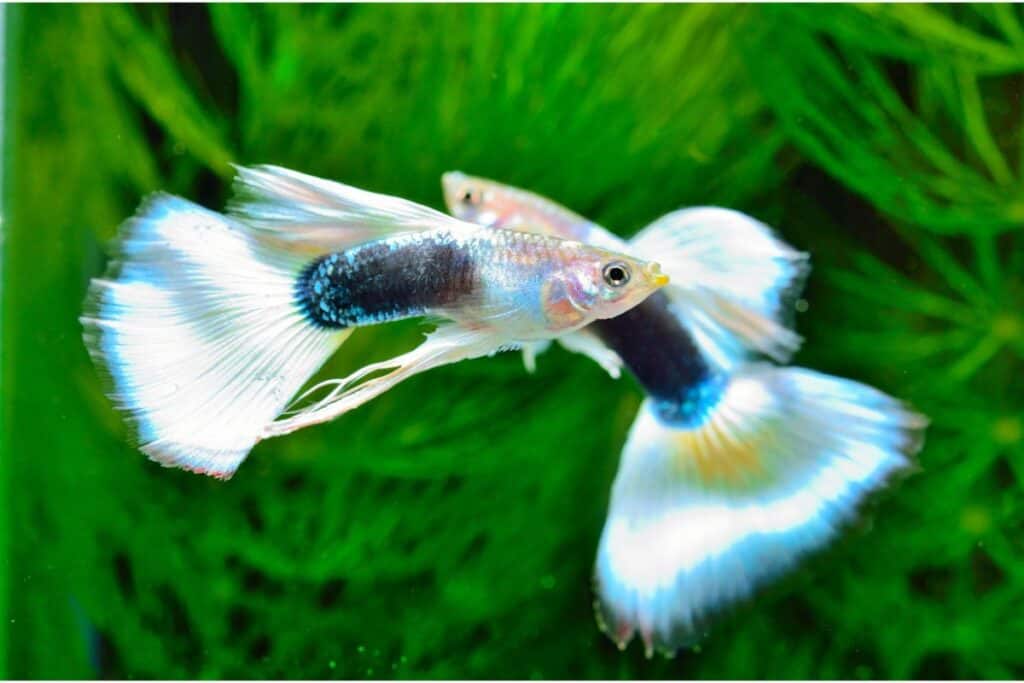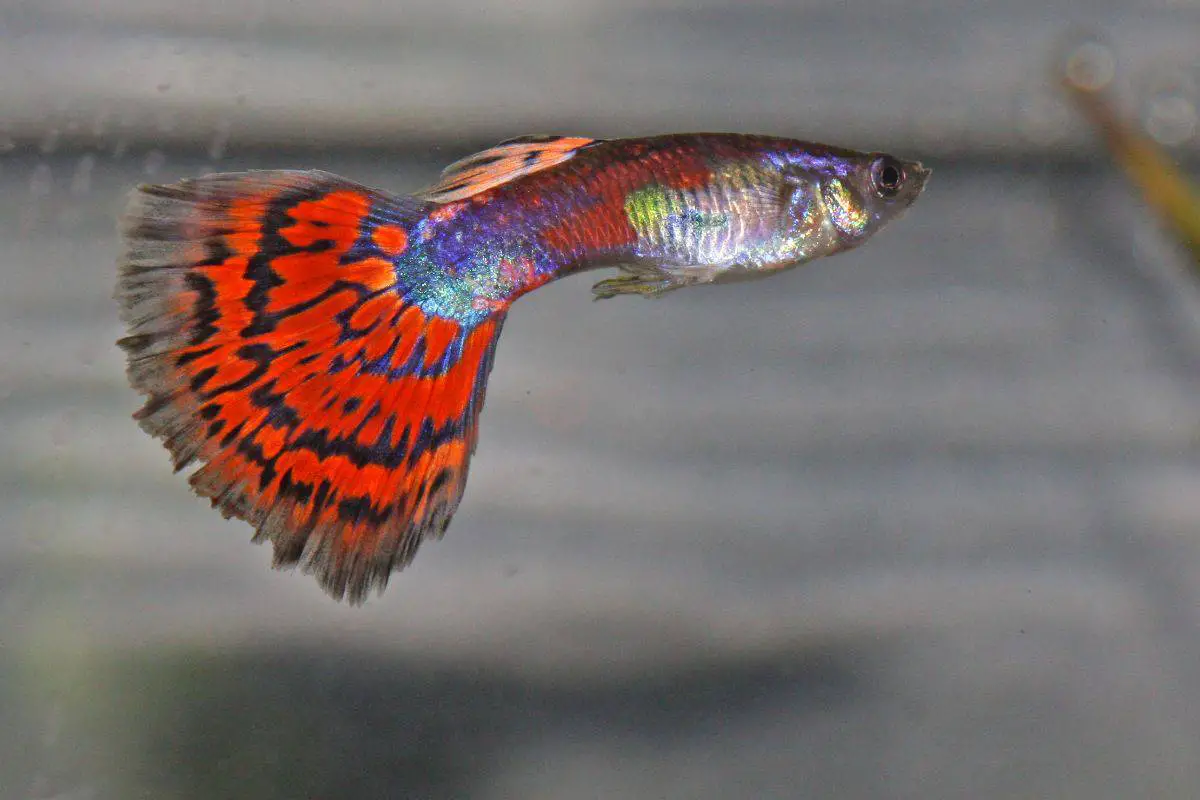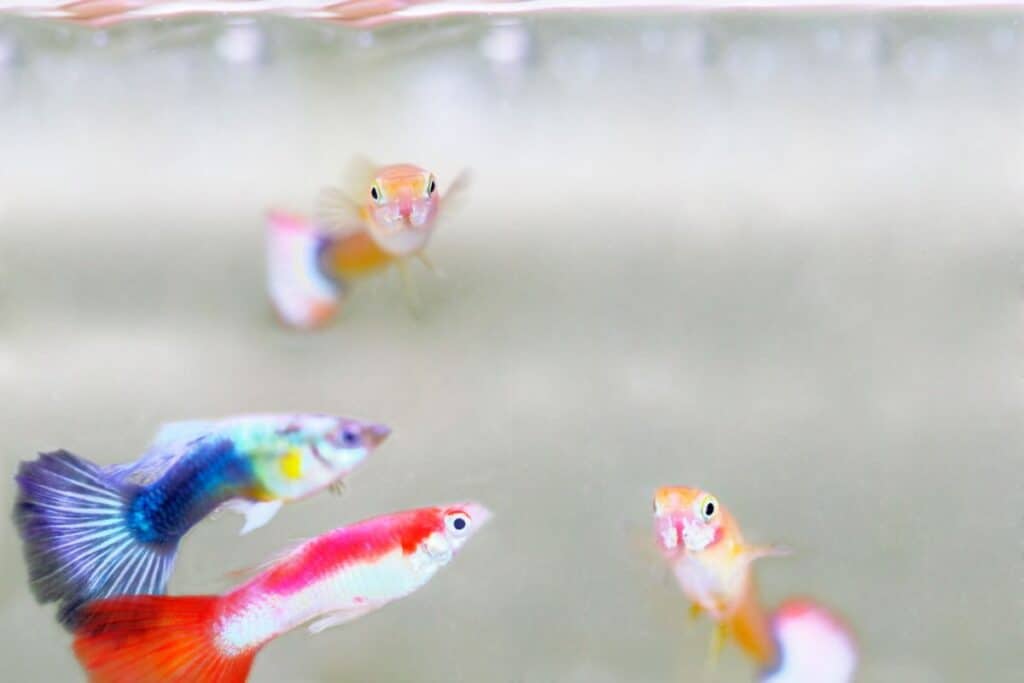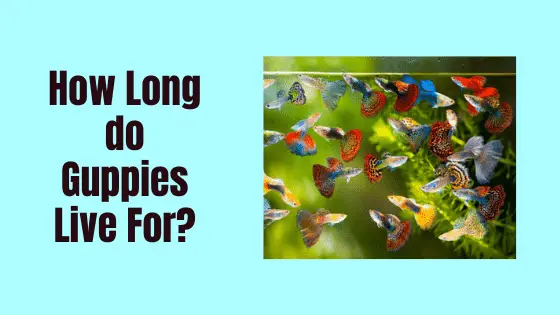Do you ever think about the lifespan of different animals and species from time to time? It is very interesting to find out about different types of creatures and their lifespans and why they are this way.
Most reptiles, fish and animals are very different to us humans because of how they live, what they live for and when they die. Most of it comes back to the circle and purpose of life but some stories can be super interesting.
Guppies are one of the most popular freshwater fish in the aquarium trade, known for their vibrant colors, hardiness, and ease of care. If you are considering adding guppies to your aquarium, it’s important to know how long they typically live for, so you can provide the best care possible and enjoy their company for years to come.
In this blog post, we’ll take a closer look at the lifespan of guppies, as well as factors that can influence their longevity.

What Is The Lifespan of a Guppy Fish?
Like any creature, their potential lifespan is not an exact science because everyone and everything is very different.
The average lifespan of a pet guppy fish is between 1-3 years old.
However, there have been guppies found to live for more than five years. Wild guppies tend to live longer than those in captivity.
You can never put an exact number on a guppy’s age because you just never know. Like anything, you are more likely to live longer if you are fed well, are in a good environment living a stress free, peaceful life, without picking up any illness.
Guppies are definitely the same! They need to be in clean water and they need to have a good routine of feeding.
The stress free part is definitely an added bonus because if your guppy is feeling happy and calm in its surroundings then it could add a good few months onto their time, which means you get to enjoy them for longer!
Can You Improve The Lifespan of a Fish?
As I have mentioned previously, you can definitely help improve their lifespan. Certain things in life aren’t good for you when it comes to how long you are going to live. If your guppy smokes, drinks and parties all night they won’t be living out old age now, will they?
As with most things in life, you need to be putting the right things in to get the best out.
There are certain areas that can help to improve the lifespan of your guppy fish:
Genetics.
Your Guppy is more likely to live longer if it has good genetics running through them. If your guppy has poor genetics then they will most likely not make it through the younger stages.
Unfortunately many with poor genetics won’t even make it into being an adult guppy! This is usually a result of overbreeding and poor conditions.
If you are buying them from a specific guppy breeder who has a genuine love of the species, keeps them healthy and cares about their reputation then you shouldn’t have any problems. This means they are more likely to be cared for, looked after and have a healthy diet.
Most of the reputable breeders will have some form of online presence which you can have a look at, maybe even some reviews you can check out as well.
There are some important things you need to look out for when choosing a fish for your aquarium. You want to ensure the fish isn’t carrying a parasite that can kill off the rest of your tank within days.
Have a look at this 3 minute video which talks you through what to avoid when picking out a fish for your aquarium. This applies to all types of tropical fish, not just guppies.
Quality Food.
The most obvious variable is making sure that what they are being fed is of a high quality. It is also really important that you watch what you feed them because they will literally eat anything that is on offer. Overfeeding fish is just as bad as underfeeding.
You want them to thrive with their food because it will help them live longer. You also need to make sure that they aren’t just eating the same food everyday; you need to mix up the diet and get some variety on their menu!
Guppy food is very common in pet stores or online. You will be able to find food such as, frozen bloodworms, veggie pallets, freeze-dried brine shrimp, and freeze dried tubifex worms.
You also need to make sure that they have everything that is necessary to fulfil their diet such as minerals and vitamins, just like us.
Avoid Overstocking.
Keep the number of guppies in your tank at a reasonable level to prevent overcrowding and stress. An overcrowded fish can be a very stressed fish, which can end up in a very dead fish.
You also need to have an appropriately sized fish tank. This will provide your guppies with enough space to swim and explore their surroundings.
Water Conditions for your Guppy.

We can definitely compare their water to our air. It needs to be clean for them to be healthy and live longer. They spend all of their time in this water and you cannot allow it to build up with unwanted mess, as that will change the chemical balance which will result in sick fish.
The best water conditions for guppy fish:
- Water temperature: 72-82 °F (22-28 °C )
- Water pH: 6.8-7.8
- Water hardness (dGH): 8-12
If you are going to use tap water to fill your tank, then you just need to take into consideration the small amount of chlorine and heavy metals inside. This is ok for humans to consume because our bodies can handle it.
However, for fish, this can be really damaging. Therefore, you would also need to do water conditioning to make sure all of that is removed from the water before the fish are safe to be in it.
You can buy water conditioner for fish tanks that will make it safe for fish. It is very cheap to buy. I use this one which I get from Amazon.
Quarantine New Fish.
When adding new guppies to your tank, quarantine them for a period of time to ensure that they are not carrying any diseases that could harm your existing fish.
Stress.
As I mentioned earlier, stress can be very dangerous for your fish. You need to consider how your fish are getting on with their tankmates. They need to have enough space in a tank because if it becomes too much for them being surrounded by too many fish all of the time it can cause them stress, as well as a bit of in-tank fighting. Fish are like humans, they will like some and be totally irritated by others. That is why a big enough tank is essential.
The correct male to female ration of your guppies is also very important. Male guppies spend most of their time chasing the lady guppies everywhere. You must have a ratio of at least 3 females to every male guppy, or the poor females will literally be harassed to death.
How to spot stress in your guppy.
Changes in Appearance
One of the first signs of a stressed guppy is a change in their appearance. Stressed guppies may lose their vibrant colors or develop pale patches on their body. They may also lose weight or become emaciated if they are not eating properly. Keep an eye out for any physical changes in your guppies and take action if you notice anything out of the ordinary.
Abnormal Behavior
Stressed guppies may exhibit abnormal behavior such as hiding, cowering, or swimming erratically. They may also become more aggressive towards other fish in the tank or start to nip at their fins. If you notice any unusual behavior in your guppies, it’s important to investigate the cause of their stress and take steps to address it.
Gasping for Air
If your guppies are gasping for air at the surface of the tank, this may be a sign of poor water quality or a lack of oxygen in the tank. Stressed guppies may also breathe rapidly or show signs of labored breathing. Ensure that your tank is properly aerated and maintain good water quality to prevent your guppies from becoming stressed.
Reduced Appetite
Stressed guppies may lose their appetite and become less interested in eating. This can lead to weight loss and other health problems if not addressed. Provide a varied and nutritious diet to entice your guppies to eat and ensure that the water quality in the tank is optimal.
Fin Rot or Fungal Infections
Stressed guppies are more susceptible to fin rot and fungal infections, which can cause their fins to deteriorate and become ragged. Keep an eye out for any signs of fin rot or fungal infections, such as frayed fins, white or gray patches, or discoloration. Treat these infections promptly to prevent them from spreading to other fish in the tank.

Conclusion.
To sum up, your guppy can hopefully live for anywhere between 1-3 years, but there is a chance they could live longer if they are in their idea of guppy paradise. The most important things are to keep them happy and free of illness to give them the best chance of a long and happy life.
I’m going to leave you with this video all about guppies. It doesn’t just refer to their lifespan but also important advice on how to make them happy and feel safe, which is definitely very important.

